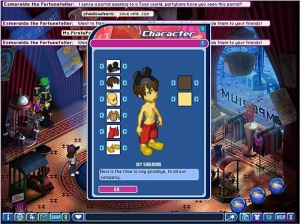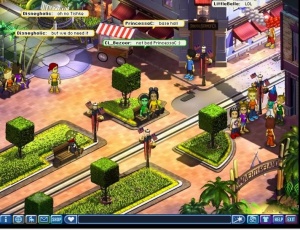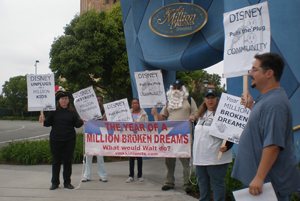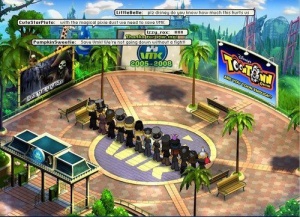Virtual Magic Kingdom
Virtual Magic Kingdom (VMK) is a free, online massively multiplayer online game developed by Disney in 2005 as part of the 50th-anniversary for Disney Parks. The game mimicked real-life features of the Disney parks in Florida and California, including Frontierland, Tomorrowland, and Main Street. VMK players used an avatar to explore, chat, play mini-games, and ultimately earn in-game credits to purchase items and clothing for their avatar. VMK shut its service down in 2008, three years after the promotion began.
Contents
Gameplay
Avatars
Players used a customizable avatar represented with a username to navigate the game. Until a player's username was approved by staff, a temporary username, "Guest" followed by a string of numbers, was assigned. Players could also select their desired username from a pre-approved generated list of random adjectives and nouns. Gender, skin color, hair color, hair style, and clothing were all customizable attributes. Players were given their own themed Guest Room which could be later personalized with objects. Each player had a profile that showed their avatar portrait and their customizable signature.
Locations
Players used a map to visit different locations inspired by the Disney parks. These included Frontierland, New Orleands Square, Adventureland, Main Street, Fantasyland, and Tomorrowland. Shops, mini-games, and other players could be found at the different locations. Walking off the screen would transition to a new location.
Mini-Games
Within these locations, players could participate in mini-games in order to earn in-game credits. Many of these games were based on other Disney affiliated characters, such as Pirates of the Caribbean and the Haunted Mansion. Mini-games included the following:
- Magic Checkers
- Pirates of the Caribbean Capture the Flag
- Pirates of the Caribbean Ship Battle
- Jungle Cruise Photo Safari
- Castle Fireworks Remixed
- Street Party Music
- The Haunted Mansion
- Airlock Escape
- Blast in Space
- Hyperspace Mountain
Players could also participate in Quests, which gave riddles and clues. Completion of quests rewarded players with special edition collectable items.
Monitoring and Safety
Due to the game’s young target audience, specific restrictions were placed on gameplay. Swear words, names and locations were outright banned, as well as other words, such as “hot.” However, many players developed in-game slang to work around these limitations (e.g., substituting words, using acronymns to spell names). To support the monitoring process, the game closed everyday between 10pm–7am PST. Players could also report other players for their behavior. Players could be temporarily or permanently banned.
Closure
VMK shut down at 10pm on May 21, 2008. Before it officially closed, a group of fans protested its closure at Disneyland’s entrance, claiming that the closure marked the end of an online community. Other fans on forums started a petition to keep the game open, ultimately gathering 20,000 signatures.[1] Disney spokesperson John Spelich claimed that VMK was only intended to remain open for 18 months after its original opening in 2005, however unexpected popular demand delayed its inevitable closure. Spelich also claimed that Disney regarded VMK as a great success, with over one million avatars created; however, other projects that Disney was investing in at the time, such as Club Penguin, surpassed VMK in popularity and warranted the closure.
Although Disney’s official statement claimed that the closure marked the end of the anniversary promotion, some fans speculated there were other reasons, including failures to properly monitor the chat feature.
Fan Reboot
In the years after the closure, fans of the game have attempted to recreate VMK. Much of the reboot effort is from former players who played VMK during their childhood and cite nostalgia as their motivation. There are two popular attempts to bring back the game in various forms, VMK Revisited and MyVMK. Neither are affiliated with Disney or the original VMK.
VMK Revisited
VMK Revisited is a website aimed at fans of the original VMK game. According to the site’s FAQ page, the goal of the site is to bring the “VMK magic back to life.”[2] This site is not a game, but rather a collection of stills, animations, and sounds from the original VMK. A forum on the site allows fans to converse about the original VMK.
MyVMK
MyVMK is a downloadable fan recreation of the game with similar gameplay to the original VMK, developed by three fans and now played by hundreds of players daily.[3]
Ethics
There are a couple of ethical conversations you could have on this topic.
Avatars
Firstly I want to talk about online gaming, in particular Avatars. Dean Cocking claims that online we present multiple selves and that these versions of ourselves affect our interactions--"My claim has been that these plural, and often uncooperative, aspects of self we never the less commonly regard as indicative of the character, including the moral character, of persons and as providing relevant grounds for our interpretive interaction with one another" [4]. Being able to customize your avatar allows the user to play with their identity, which beneficial to the user can undermine the people who interact with the user. As a whole however allow the user to test out different identities and customer names could be better for them as a whole. The user just has to remember how their avatar is present affects how others will interact with them.
Reboots
The other ethically interest aspect of Virtual Magic Kingdom is the fan reboots.
References
- ↑ Sanders, Peter., "Fans Resist End of Virtual Sidneyland"., The Wall Street Journal., May 20, 2008., https://www.wsj.com/articles/SB121124116733805445
- ↑ VMK Revisited., retrieved April 22, 2019., http://www.vmkrevisited.com/index.html
- ↑ MyVMK., retrieved April 22, 2019., http://www.myvmk.com/home#top
- ↑ Cocking, Dean., "Intimacy and Privacy Online"., Plural Selves and Relational Identity, Page 140, retrieved April 22, 2019





